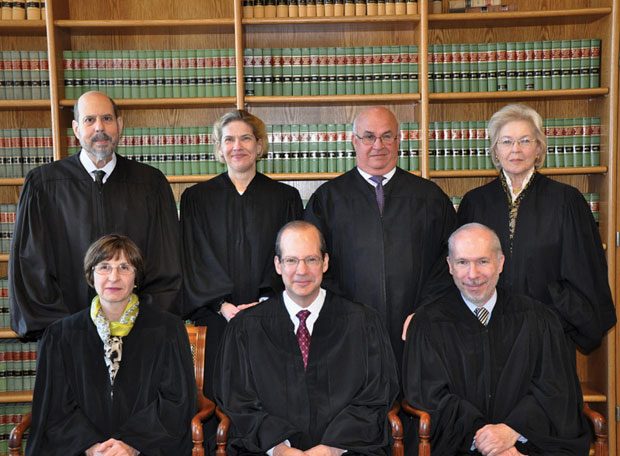
The New Jersey State Supreme Court has been without a full complement of justices for three years. It’s an unprecedented situation that has turned our state’s highest court—long a beacon for judicial excellence and independence—into a case study for partisan political wrangling.
New Jersey’s 1947 Constitution stipulates that the governor shall nominate and appoint the chief justice and associate justices of the Supreme Court and that the state Senate will provide “advice and consent” on the nominees. But all of Governor Chris Christie’s picks—except for Justice Faustino J. Fernandez-Vina, a Republican who was confirmed by the Senate in November—have been put on hold, rejected or not considered at all.
Current nominees David Bauman (a Republican) and Robert Hanna (politically undeclared) have been waiting for Senate confirmation for more than a year, but no hearing date has been scheduled. As a result, two of the seven justices are serving on a temporary basis.
“What is currently going on with the Supreme Court is very troublesome,” says Paul Tractenberg, professor of law at Rutgers Newark and author of the book Courting Justice: Ten New Jersey Cases That Shook the Nation (Rutgers University Press, 2013).
The problem goes back to 2010, when Christie opted not to reappoint Justice John Wallace, a Democrat. “Since then, we have been snarled up in this unfortunate and highly political situation with a governor still pretty explicitly trying to reshape the court,” says Tractenberg. Meanwhile, Senate Democrats are resisting Christie’s efforts. “It is not a happy time,” says Tractenberg, “and hopefully people will pull back from the brink.”
Tractenberg explains that our Supreme Court has achieved national prominence in part because of its tradition of partisan balance. “From the days of Chief Justice Arthur T. Vanderbilt in the 1940s, when New Jersey’s modern constitution was adopted, and actually a practice in New Jersey for about 100 years before 1947, was the notion that the court should be balanced in terms of partisan affiliation,” he says. “One of the things driving the Democrats now is the concern that Governor Christie may not be willing to adhere to that and may be altering the courts in a way that shifts that balance.”
But has the court really been balanced? “Since 1948, the court has had a Democratic majority for 50 years, compared to only 13 years of a Republican majority,” says state Senator Kevin O’Toole, a Republican.
O’Toole argues that, after winning 61 percent of the vote in 2013, Christie has a right to appoint justices who share his vision, as long as those nominees are qualified. In addition, O’Toole points out that New Jersey’s last six Democratic governors each had a Supreme Court with a Democratic majority or an even number of Democratic and Republican justices (and one independent).
The issue of balance is particularly important at a time when some in Trenton—including Christie and O’Toole—believe the court has been overstepping its bounds and needs to be reshaped and restrained. They argue that the court has gone beyond its constitutional role, for example, by mandating low- and moderate-income housing in certain communities and ruling on per-pupil spending in urban school districts.
But according to Tractenberg, the court has stepped in because New Jersey’s governors and legislators have shirked their responsibilities on these and other difficult issues. “I think the Legislature, and to some extent our governors, have wimped out by saying these are tough decisions, and how we decide them is bound to make someone unhappy, so let the court decide and then we can blame the court. That has been the dynamic for decades.”
The stalemate is likely to continue. The Democrats don’t feel compelled to approve any Christie nominees, and the governor isn’t looking to continue this fight (which he is unlikely to win) as he ponders a White House run in 2016.



